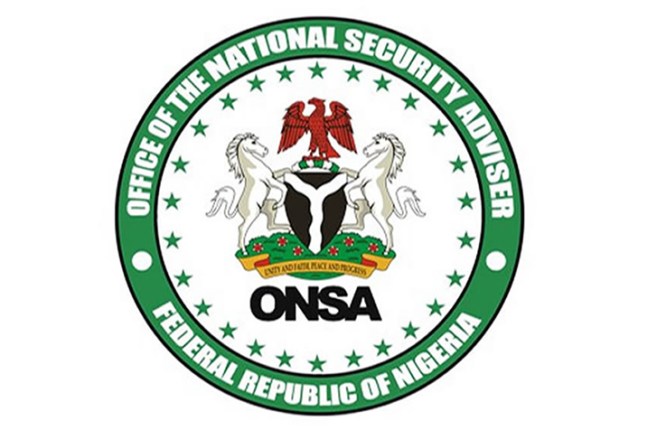Counter-terrorism: ONSA raises concerns over use of UAVs by terrorists
The Office of the National Security Adviser, on Monday raised concerns over the use of Unmanned Aerial Vehicles by terrorists and other criminal elements to disrupt the country’s socio-economic activities. It, however, said the National Counter-terrorism Centre in the Office and the United Kingdom government has taken steps to mitigate the aviation-related threats associated with […]

Office of the National Security Adviser (ONSA)
The Office of the National Security Adviser, on Monday raised concerns over the use of Unmanned Aerial Vehicles by terrorists and other criminal elements to disrupt the country’s socio-economic activities.
It, however, said the National Counter-terrorism Centre in the Office and the United Kingdom government has taken steps to mitigate the aviation-related threats associated with counter-terrorism operations.
The national coordinator of the centre, Maj. Gen. Adamu Laka, disclosed this in Abuja on Monday during the opening session of the Counter Man-Portable Air Defence Systems (MANPADS) Workshop.
“It once again emphasises the need for us to work together, identifying our crucial roles and collaborating to record great progress in the country’s aviation security.
- Police kill 3 suspected bandits in Benue
- Bagudu: N6.2 trn supplementary budget to fund infrastructure, minimum wage, others
“It, therefore, stresses the need for inter-agency collaboration and cross-border relationships to stem this tide because terrorism recognizes no borders.
“In view of this, the NCTC-ONSA in collaboration with the UK Department for Transport Aviation Security seeks to address this aspect of aviation security management in Nigeria with this workshop.
“This workshop should be seen as a call to re-awakening for collaborative effort which we all must embrace, as victory by one is victory by all of us and a greater victory for our entire nation, the African continent and the world at large,” he said.
The senior military officer, while charging all the participants, added that the development must be adequately tackled through continuous collaboration by aviation security stakeholders.
On his part, Mr Jonathan Kendall, Aviation Security Assistance officer for the UK Department for Transport, at the British High Commission, said the workshop was looking to mitigate what he called a ‘standoff threat’.
Kendall said while a nation could secure the terminal building as much as it could, the workshop looks at countering the wider threat beyond the perimeter fence.
He said on takeoff and landing, aircraft are vulnerable to shoulder launched missiles which can impact an aircraft up to 30,000ft.
“We have brought a team from the Royal Air Force regiment who are experienced in countering these threats and they are looking to further develop the Nigerian capability in this area, particularly in the area of vulnerability mapping.
“I would expect the Nigerian agencies to further develop their MANPADS capability, the counter MANPADS capability, particularly when it comes to patrolling and mapping vulnerable areas of the airport,” he said.
